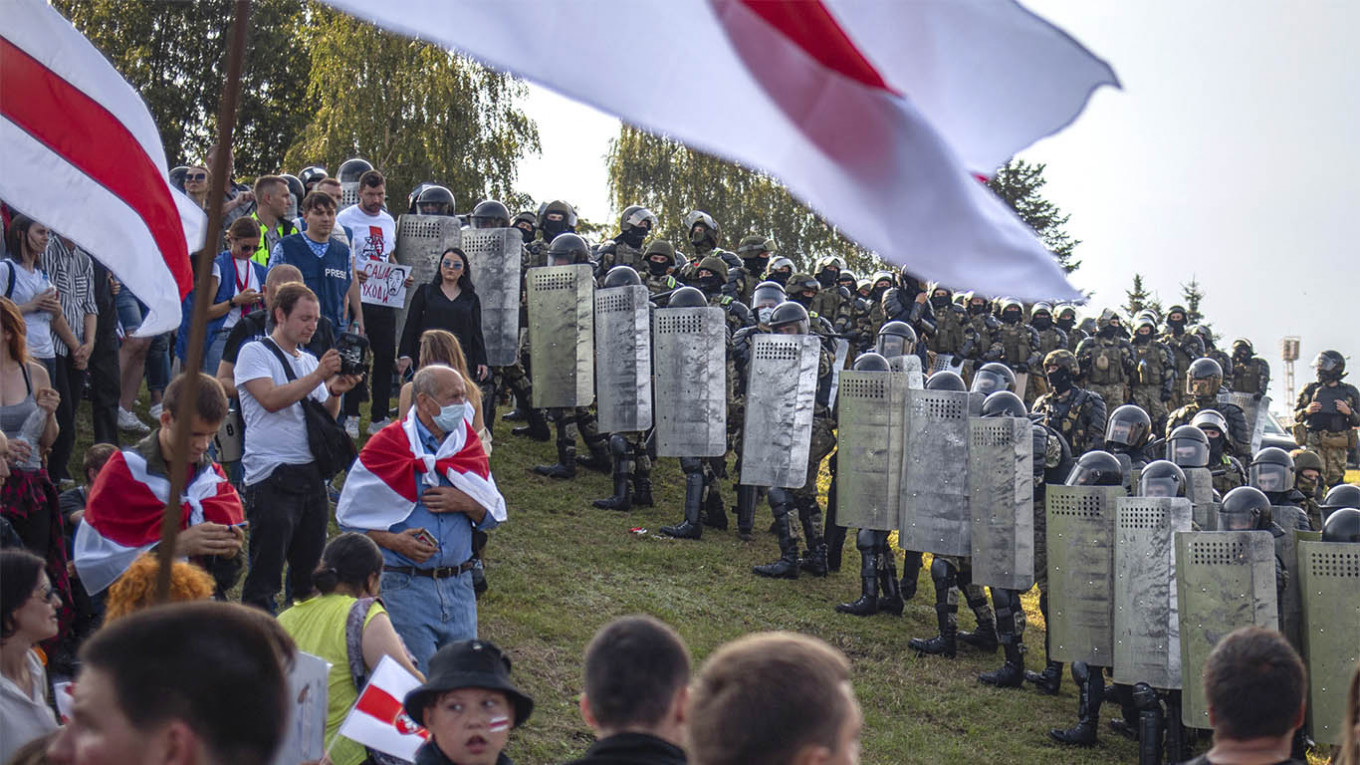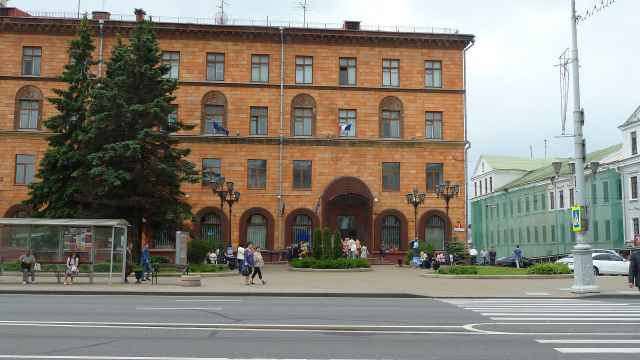Eight years ago, Anton, a Russian programmer then in his mid-twenties, was lured to Minsk with an unbeatable offer from one of Belarus’ booming online games companies.
He knew the country’s strongman president Alexander Lukashenko was no liberal, but having protested at the Bolotnaya Square demonstrations in Moscow in 2011-12 against Vladimir Putin’s return to the Russian presidency and seen the police suppression there, he thought he was prepared for anything.
Two weeks ago he decided to go home to Russia after seeing many of his friends in the IT sector beaten, threatened and detained in a brutal crackdown against tens of thousands of protesters who took to streets after Lukashenko claimed a landslide victory in disputed presidential elections.
“The psychological stress was becoming unbearable. It is very hard to continue working if you feel unsafe, if people around you have been arrested, and if you don’t know if you’ll be next,” Anton told The Moscow Times, asking to be referred to only by his first name as he is fearful of repercussions should he return to Belarus.
He added that his employer, a large international technology company, started quietly moving employees out of Belarus even before the elections and has accelerated relocations amid the country’s largest protests since the break-up of the Soviet Union.
Hundreds of Belarus’ brightest, most highly skilled and affluent young workers have already left the country — moved temporarily by their companies to a nearby country so they can carry-on working amid internet blackouts and avoid raids and searches by the security services. Others, as in Anton’s case, have left of their own accord, fearful for their safety.
The saga of Lukashenko’s re-election — from the emergence of a unified opposition through a three-day internet shutdown to multiple accounts of police violence and torture — has frightened Belarus’ fledgling, progressive-minded IT industry and the wider business community in the country, said Katia Glod, non-resident fellow at the Center for European Policy Analysis (CEPA).
“The middle classes — first of all private businesses — were at the forefront of the protests. They wanted to achieve change so much, because they clearly saw that the current government’s policy had reached a ceiling in terms of business development and that things will not move any further unless there are reforms.”
As Lukashenko seems committed to staying in power, many of them are reconsidering their future in the country.
“Ninja-style”
Assessing the extent of the current exodus is tricky. Companies are reluctant to broadcast that they are shipping dozens of staff out of the country for fear of raising red flags to the authorities. Anton said firms were moving staff “ninja-style.” One IT worker The Moscow Times spoke to last week said they had been told that day they were being moved to Kiev, and were instructed not to speak publicly as it could complicate their departure or draw attention to the company.
But relocations in the IT sector are accelerating, and if Lukashenko holds onto power many are likely to become permanent, said Alexei Kuzmenkov, co-founder of Dutch-Belarusian medtech startup Deepdee, which has an office in Minsk’s famous Hi-Tech Park.
He estimated that at least 50 firms in the Park — more than 10% — have already moved some staff out of Belarus, mainly to Ukraine, Russia, Poland or the Baltic states.
“More than 100 others are still making preparations or thinking about relocating,” he told The Moscow Times by video call from The Netherlands, where he is based.
After Yandex’s offices were raided by Belarus’ KGB security services and the Russian tech company started moving staff out of Minsk, some felt an irreversible blow had been dealt to the industry.
“Even if Lukashenko survives, Belarus’ IT industry will likely not,” Franak Viacorka, a Belarusian journalist and non-resident fellow at the Atlantic Council, wrote on Twitter.

“Companies’ first concern is employee safety. You never know if an employee will be able to work tomorrow,” said Darya Miskevich, a Belarusian IT recruitment and relocation consultant, referring to the possibility of people being arrested or detained in Minsk.
“The second risk is the internet blackouts. The internet is being controlled by the regime — and it’s chaotic,” she added.
“It was a really bad mistake by the authorities to shut down the internet for three days,” said Daniel Krutzinna, an adviser to former Belarusian prime minister Sergei Rumas who was sacked by Lukashenko in June.
“For IT companies that depend on a permanent internet connection with their clients abroad, or if it’s an office — like with Yandex — that is supporting their Russian operations, it’s completely unacceptable. The internet shutdown might happen again, which is really scaring the IT community, and it’s really counterproductive to this big effort from Belarus over the last 10 years to significantly build up its IT industry,” he added.
The internet blackouts, repression in the wake of the vote and Lukashenko’s own anti-business rhetoric have prompted many young professionals, business owners and entrepreneurs to consider a permanent departure from Belarus, analysts and insiders say.
“If Lukashenko stays in power, everyone who can leave, will leave,” Anton said. “I will definitely not go back. I understand I’m not representative of the whole industry, but all of my colleagues and friends in the sector said they would leave if Lukashenko stays. And we’re talking about within a matter of a few weeks or months.”
Even if an immediate wave of emigration doesn’t materialize, talk of a more sustained ‘brain drain’ from Belarus’ middle classes over the next few years is circulating.
“If there is no change, then definitely a lot of people will leave. A lot of founders, business owners and just normal, simple, smart Belarusian people will leave,” said Miskevich.
Deepdee’s Kuzmenkov said that while most of the firms at Belarus’ Hi-Tech Park would probably remain, the damage to the sector has already been done.
“Even though they will stay, the investment situation is so broken that we probably won’t see any progress in the next five years. Young, smart people will leave year-by-year. The economy and businesses will just freeze, or decline. And the people who will leave the country are those who are really active — those who have founded businesses, for instance. Our best people will leave.”
Statist policies
Analysts say this scenario is unlikely to concern Lukashenko, who has already signalled he intends to double down on his statist policies.
“What’s likely to follow is a more repressive political environment, which is not something that would be conducive to a positive business environment — especially in the IT sector,” said Alex Kokcharov, political risk analyst with IHS Markit. “I can easily see a lot of Belarusian IT firms moving their bases elsewhere if Lukashenko remains in power.”
“I don’t think that the current government really cares … Power is far more important for Lukashenko than any economic development,” said Glod.
Even before the election, there were ominous signs. In June, Lukashenko sacked his prime minister Sergei Rumas — an economically minded figure who had brought a degree of macroeconomic stability to the country and supported reforms — putting members of the siloviki, or secret service, military and security figures, into key government and economic positions.
“When Rumas was prime minister, you had a balance inside the government,” said Krutzinna, his former adviser.
“You had quite an educated, economically oriented government with the prime minister and deputy prime minister being quite reform minded. But with the reshuffle in early June, the government is now mostly people with a military or secret service background … Their priority is control,” he told The Moscow Times.
On the other hand, should the opposition somehow make a breakthrough and Lukashenko leave power, Belarusians are optimistic they may finally be able harness the country’s economic potential, which has long been hampered by its Soviet-era industries, heavy state control and weak legal protection for private players.
“It’s very fertile ground. There is huge potential, and there is a strong desire among many Belarusians abroad to come back to Belarus and invest,” said Glod.
Both Miskevich and Kuzmenkov — Belarusian entrepreneurs who have relocated to Europe — say they would enthusiastically pour money into a post-Lukashenko Belarus.
“I believe in this country. My family and I will buy accommodation there and invest in businesses there. And I know lots of people who will do the same,” said Miskevich.
“If the regime changes, Belarus has a really good chance of becoming a great IT country and a place of reform. But if nothing changes, it will be very painful for businesses.”
A Message from The Moscow Times:
Dear readers,
We are facing unprecedented challenges. Russia's Prosecutor General's Office has designated The Moscow Times as an "undesirable" organization, criminalizing our work and putting our staff at risk of prosecution. This follows our earlier unjust labeling as a "foreign agent."
These actions are direct attempts to silence independent journalism in Russia. The authorities claim our work "discredits the decisions of the Russian leadership." We see things differently: we strive to provide accurate, unbiased reporting on Russia.
We, the journalists of The Moscow Times, refuse to be silenced. But to continue our work, we need your help.
Your support, no matter how small, makes a world of difference. If you can, please support us monthly starting from just $2. It's quick to set up, and every contribution makes a significant impact.
By supporting The Moscow Times, you're defending open, independent journalism in the face of repression. Thank you for standing with us.
Remind me later.







